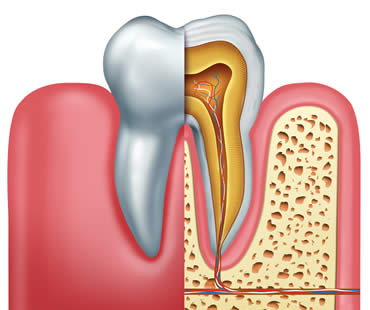
Endodontics is a dental term often linked to a more common dental procedure you’ve probably already heard of called root canal treatment. Endodontics focuses on the pulp of your tooth, which holds nerves and blood vessels supplying nutrients and oxygen to your tooth. When the pulp is infected or injured, endodontic treatment may be performed to save the tooth.
During endodontic treatment, the hollow part inside your tooth is cleaned, disinfected, and filled. It is often the best way to save a tooth that has been damaged by decay, trauma, or other causes. Common symptoms that endodontic treatment is necessary include pain, tooth sensitivity, or exposure of the pulp due to tooth fracture.
After examining your tooth and X-ray results, your dentist will recommend the kind of endodontic treatment you need based on how seriously the pulp is impacted. One type is called vital pulp therapy, which has a goal of preserving and protecting your tooth’s pulp. This procedure involves removing only the pulp from the crown of your tooth and not from the root. It is only advised when there is no swelling or abscess present, and the tooth is secure.
Another type of endodontic treatment is non-vital pulp therapy, which is known as root canal treatment. It is performed when there is no chance of saving the pulp of your tooth. The whole pulp will be removed from inside your tooth, and the canals will be cleaned and filled with a special material. Then a stainless steel crown will be placed on the tooth.
Sometimes endodontic treatment is not recommended, and the tooth needs to be extracted instead. This choice depends on factors such as tooth location, age of the tooth, extent of damage, and the patient’s overall health. Your dentist will be able to advise you on the best treatment for your condition.
If you live in the Meriden area contact us today

A toothache can ruin your life, at least until you have treatment that relieves the pain. Headaches, mouth pain, or inability to chew can all accompany a tooth problem. It is not unusual for tooth pain to be linked to tooth decay, and when it becomes advanced you just can’t ignore it. This is when root canal therapy is valuable.
What is the procedure?:
Root canal treatment focuses on the pulp cavity, which is the inside of the tooth. When the pulp is infected or inflamed, it needs to be completely removed from the tooth in order for it to heal. It doesn’t matter if the damage to the pulp results from severe decay, tooth fracture, faulty crown, repeated dental procedures, or trauma. Even if the damage isn’t visible or causing unbearable pain, the bottom line is that the interior of the tooth must be cleaned out, disinfected and sealed to prevent future infection. A crown is typically placed on top of the tooth to protect it and complete the procedure.
Why is it necessary?:
If left untreated, an infected pulp can lead to intense pain or spread to other parts of the body. Root canal treatment is the best way to save the tooth and restore its function. Other benefits of the procedure are maintaining the tooth’s natural look, protecting other teeth from excessive wear, restoring normal chewing ability, and allowing normal sensation and biting force.
How long does it take?:
The procedure is more routine than you might think. An experienced dental professional can complete the process is one or two appointments, depending on your specific case. Once the procedure is complete, your repaired tooth should last as long as the rest of your teeth.
Our dental office is located in Meriden

Even though regular checkups and proper dental hygiene greatly decrease the need for root canal treatment, the fact remains that it is one of the most common procedures performed by dentists today. What are some of the most common reasons you might need this dental solution?
Decay:
The primary cause for root canal procedures is decay that has entered the tooth pulp chamber and progressed to the point of causing infection or abscesses. Pain and tooth sensitivity often accompanies severe decay. Root canal treatment is the best way to avoid tooth extraction and restore oral health.
Trauma:
If a tooth endures strong force such as from a sports injury, car accident or fall, the trauma can damage the tooth so badly that root canal treatment is needed. Even if trauma isn’t completely evident at first, a severed nerve to the tooth can cause it to die over time.
Genetics:
Traits of teeth like their strength are passed along through genes. Some people inherit soft teeth that are more prone to decay, making it difficult to avoid decay even with diligent oral hygiene.
Tooth fracture:
A tooth can be fractured through chewing hard foods or ice, teeth grinding or clenching, or habits like nail biting. Even hairline fractures may allow bacteria to enter the tooth’s pulp and cause infections. Once the bacteria takes hold, root canal treatment may become necessary.
Deep cavity:
Deep cavities within teeth can allow infections to thrive, eventually causing the tooth to become inflamed or die. A deep cavity isn’t necessarily painful, so patients may not even realize they have an infection. Regular dental checkups help catch cavities early, before they are able to become so deep and serious.
Previous dental work:
Extensive or repeated dental work can cause trauma to teeth nerves and associated inflammation, making root canal therapy an important solution.
We treat patients from Meriden and the surrounding area

A toothache can make your life miserable. It may involve terrible tooth pain as well as headaches, sleeplessness, and difficulty eating. A trip to the dentist’s office is a must if you want relief. An examination might reveal that you need root canal treatment to save your tooth and eliminate your symptoms.
Severe tooth decay, a faulty crown, repeated tooth procedures or trauma are common causes of tooth damage. These issues can also lead to infection of your tooth’s pulp, which is on the inside of your tooth. Also called endodontic therapy, root canal treatment focuses on getting rid of the damaged tooth pulp. If infection is present, it is also removed. The root canal is thoroughly cleaned and disinfected, and then the area is filled with a special material called gutta-percha. Finally, the tooth is typically restored with a dental crown to provide maximum protection from future damage.
Some of the benefits you can expect from root canal treatment include chewing with normal biting force and sensation, maintaining natural tooth appearance, protecting other teeth from excessive wear, and avoiding a troublesome gap in the smile. In as little as one or two appointments, these benefits can be achieved without a great deal of discomfort. Innovations in technology have made the experience of root canal treatment usually no more painful or difficult than simply getting a dental filling. Once root canal treatment is complete, the tooth can last a lifetime with regular checkups and proper oral hygiene.
We look forward to seeing you in our Meriden dental office

Millions of root canal treatments are performed every year, and it is an effective and safe way to save a damaged tooth. Unlike its reputation over the years, modern dentistry allows this procedure to be practically painless and to provide relief from symptoms right away.
Anatomy
The first thing to understand is the anatomy of the tooth. Under the hard enamel on the outside of the tooth and the dentin below that, the interior of a tooth contains pulp. It houses the nerves, blood vessels, and connective tissues that all nourish the tooth. This allows it to grow properly and contributes to good oral health. After the tooth is fully developed, the tooth can get its nourishment from surrounding tissues and the pulp is not as necessary.
Necessity
The pulp can become infected, inflamed, or damaged by problems like decay, injury, repeated dental procedures, or a bad crown. If the damaged pulp is not treated, an abscess can develop or severe pain can result. Often, root canal treatment is the only way to save the tooth instead of having to extract it. Dentists advise that saving a tooth is almost always a better option, providing the most natural appearance, efficient function, and protection of oral health.
Procedure
Many patients report that root canal treatment is not much different for them than having a regular filling done. X-rays are taken and a local anesthetic is administered. Once numb, a dental dam is placed to protect the area during the procedure. Then the pulp is removed, the area is thoroughly cleaned, and then it is filled with special material for this purpose. The tooth is sealed for protection, and finally a crown is placed on top to protect the tooth. Most patients are able to return to normal activities immediately following treatment, and the procedure is permanent in most cases.
If you need a root canal dentist in Meriden, contact our office today.

Tooth decay that is allowed to become severe can cause extensive damage to your tooth, even resulting in tooth loss if not treated. Sometimes symptoms are present that cause you to visit your dentist, but other times it’s just a regular checkup that catches a problem.
The source of trouble usually begins with a small area of tooth decay that goes unnoticed. Bacteria attacks, decay thrives, a cavity may form, and infection can spread. Cavities may be filled to repair the tooth and eradicate infection, but advanced cases of decay can reach the tooth’s interior. Once it gets to the pulp, serious damage can set in. This is when symptoms often appear, sometimes becoming severe.
Once damage reaches your tooth’s pulp, some common symptoms that will prompt you to call your dentist may include:
- Slight to severe pain when biting, chewing, or even putting slight pressure on the tooth
- Minor to extreme sensitivity when your tooth comes into contact with anything hot or cold
- Inflammation or swelling near the gum line surrounding the affected tooth
- Ongoing aches in the general area of the damaged tooth, including headaches, neck aches, or earaches
- Ulcers or bumps near the damaged tooth
- Difficulty performing normal mouth functions like eating
If you experience any of these symptoms, it’s time to visit your dentist for an evaluation. Root canal therapy might be recommended to restore your tooth’s health and regain comfort and functionality. Root canal treatment involves cleaning the damaged areas of the tooth pulp to remove infection and bacteria, filling the open space, and sealing it to prevent future damage. Sometimes a crown is placed on top to complete the process.
When a tooth is severely damaged, root canal therapy provides your best chance for restoration and optimum oral health. Your dentist will effectively and safely perform the procedure, and at the same time relieve the related symptoms that you may be experiencing.
We look forward to seeing you in our Meriden dental office














